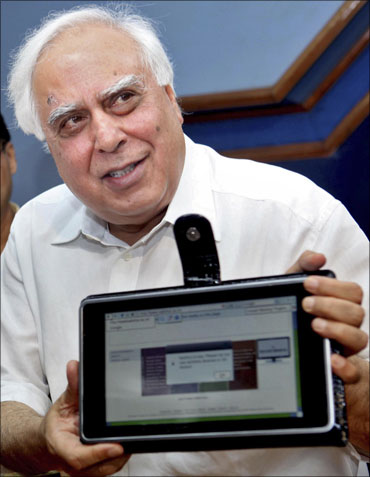India will soon have 'Navratna' Universities on the lines of the famous Ivy League varsities, which will be 'free them from the shackles of government control,' Science and Technology Minister Kapil Sibal said on Monday.
In his keynote address at the 98th Indian Science Congress at SRM University near Chennai, Sibal said that this would be achieved by measures including generous financial support and access to external funding.
"We are working on the concept of having Navratna Universities or an Indian Ivy League.
"We intend to nurture these select universities, like the public sector navratnas, by generous financial support, freedom in accessing external funding and total autonomy so as to free them from the shackles of government control," he said speaking on the topic 'Quality Education and Excellence in Science Research in Indian Universities'.
. . .
India to soon have navratna universities
Image: Human Resource Development Minister Kapil Sibal displays the low-cost computing device.Photographs: Reuters
The eight Ivy League institutions are Brown University, Columbia University, Cornell University, Dartmouth College, Harvard University, Princeton University, the University of Pennsylvania and Yale University.
He said such an initiative would be useful in achieving the challenge of developing human and social capital that will enable youth to work and compete globally.
"In regard to our existing navratnas-the Indian Institutes of Technology and Indian Institutes of Management -- we are according full powers to their boards to create posts within the approved norms, top up the salaries of the directors and faculty from the funds generated by them, open centres in India and abroad, amend rules within the framework of their Memorandums of Association and Rules, acquire and dispose property and manage funds generated on their own," he said.
. . .
India to soon have navratna universities
Image: Rediff Archives.With this autonomy, the government sought to build accountability and the director and the board would prepare annual action plans and monitorable key performance indicators at each level, he said.
With India moving towards being an 'affluent society' there was a need to tackle much more aggressively the structural inequities, especially in education front, he said. The Gross Enrolment Ratio was a 'mere' 15 per cent,
Sibal noted, adding changing labour markets and demographics are driving a 'new' demand for higher education.
. . .
India to soon have navratna universities
"These sources will continue to fuel the demand for higher education and will be fighting for more places for quality education.
"This will necessitate many more universities and colleges to be opened in the years to come. Most estimates project a minimum doubling over the next decade," he said.
The government's goal was to double the GER by 2020, and this will entail massive capacity building, both institutional as well as human, Sibal said.
. . .
India to soon have navratna universities
Photographs: Reuters
Besides increasing the quantum of faculty in educational institutions, their quality also need to be improved and 'we have taken several concurrent steps to address both these aspects,' Sibal said.
"We intend to put in place an effective quality assurance system and provide a common frame of reference for students and others to obtain credible information on academic quality across institutions, domestic as well as international.
"The National Accreditation Regulatory Authority for Higher Educational Institutions Bill, 2010 has been introduced in Parliament to provide for mandatory accreditation and creation of an institutional structure for the purpose," he said.
This was in accordance with the general principle of moving from an 'inspection approval' based mechanism of recognising institutions to a 'verification assessment' method, he said, adding plans were afoot for a National Commission for Higher Education and Research for regulating higher education.
. . .
India to soon have navratna universities
Photographs: Rediff Archives
Efforts were on to set up an Education Finance Corporation, which will refinance educational loans to students, especially from lower income families seeking to pursue professional courses, at much more favourable terms than available presently and also provide not-for-profit educational institutions access to low cost funds, he said.
As part of addressing teachers deficit and improve standards of teaching and learning, the government has set up the National Mission on Education through ICT to link thousands of colleges and departments within universities, with a view to facilitate teaching resource sharing and providing access to open educational resources.
. . .
India to soon have navratna universities
On the research front, the government was planning to set up 14 'Innovation Universities' which will be 'unique institutions' and set benchmarks, in academics and research with special focus on hunger, water, poverty and diseases through cutting edge science and technology.
"At the same time there will be emphasis on liberal arts and social sciences. These Innovation Universities would be innovative in their governance, in their financial structure, in their academic and research structure, in their content and in every other way," he said.
Speaking on the Indian health innovation, he said the ministry was 'spearheading' the movement for supporting innovations that have the potential to make the 'greatest impact' on public health challenges.
India to soon have navratna universities
The minister said focus was also on long term academia-industry collaborative research, encouraging multi-disciplinary collaboration among business, government, academia and R&D thereby creating an environment that supports technological development which is aligned with and driven by industry need.
Further, efforts were on to take up in collaboration with concerned government economic ministries modernisation and upgradation of technology in use by the small and medium enterprises, encourage the formation of international research and development, technology and innovation consortia between Indian and foreign entities and provide tax incentives to businesses that collaborate with academia and R&D researcher, Sibal said.









article